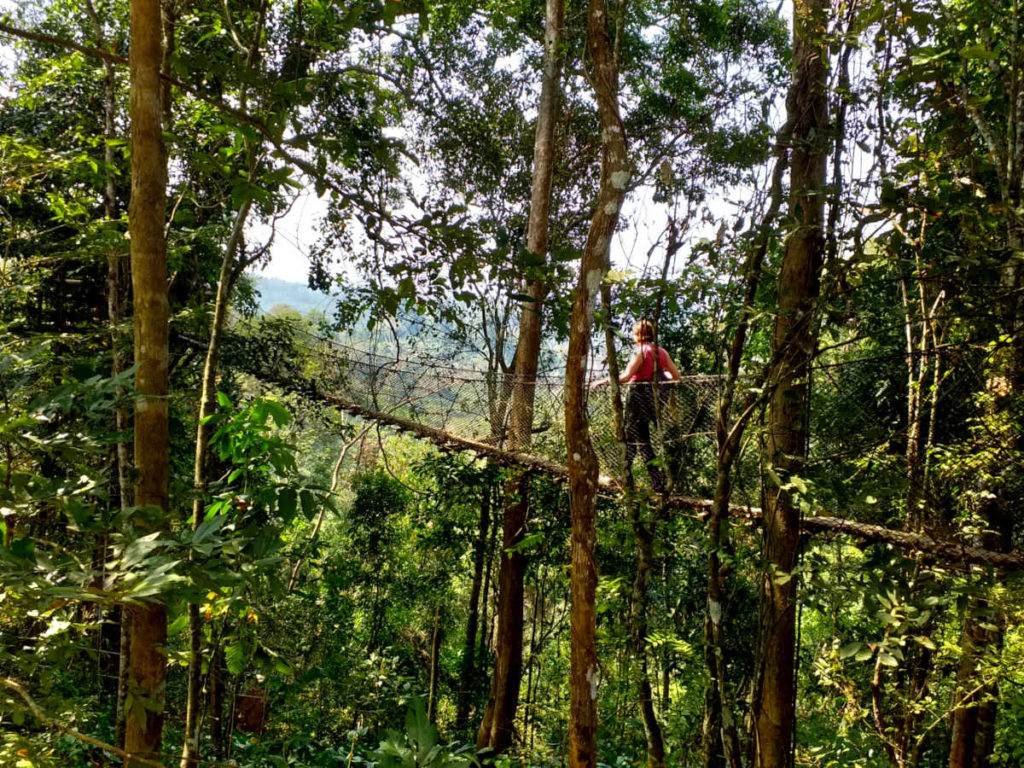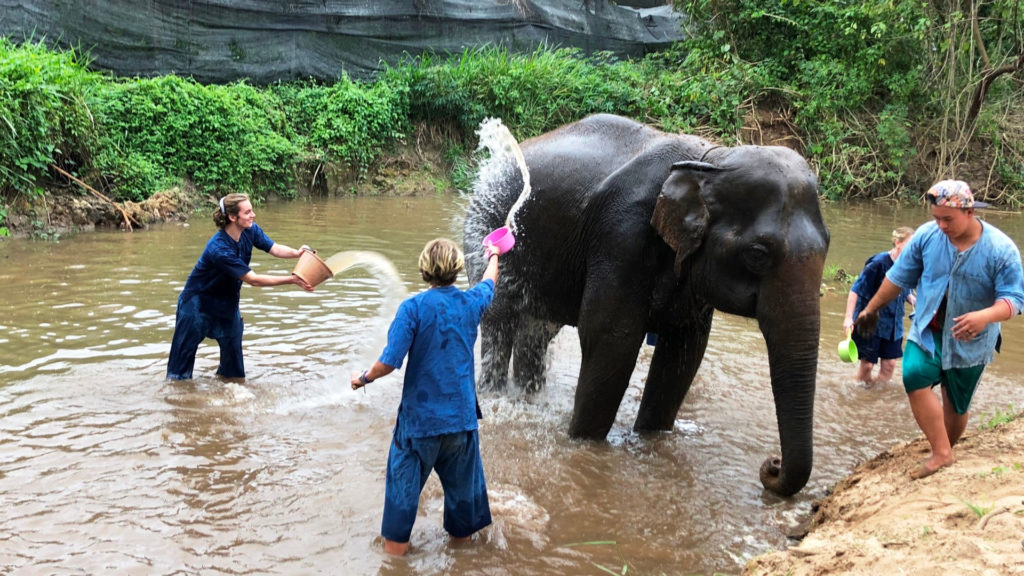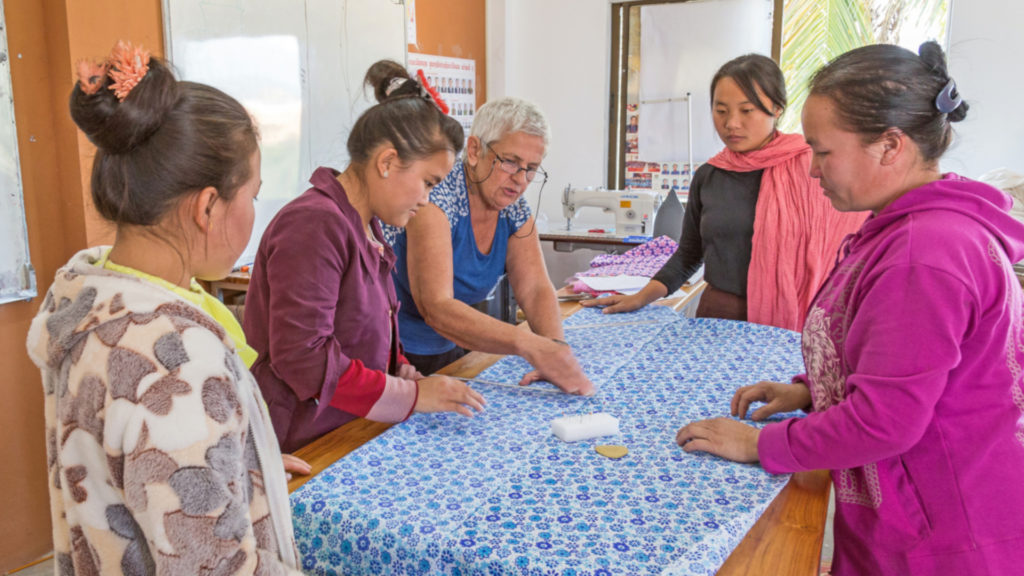Travel is good for the soul. It expands the mind – and our hearts. And it helps us realise life’s most important purpose, which is to love and respect everyone around us and make the world a better place for humans and animals. But every time we pack our bags and jet off for a new adventure, we leave a footprint behind. This footprint is made up of the emissions from each mode of transport used, as well as other resources acquired to help us have an enjoyable time.
So how do we reduce our impact on the planet when we travel? The biggest problem lies with mass tourism, as many operators do not have environmental care at the top of the agenda. Ecotourism is an alternative to mass tourism and is a great way of exploring the world off the beaten path in the most sustainable way possible.
If this sounds like the type of travel that interests you, read on for a detailed explanation about what ecotourism is, what its principles are, how it can be achieved, and the traps to watch out for.
Ecotourism definition
Ecotourism is a form of tourism that involves responsible travel to fragile, pristine and relatively undisturbed natural areas. These natural areas usually have programmes to conserve the environment or sustain the wellbeing of the local people.
An ecotourism holiday is done on a smaller scale compared to commercial mass tourism and is intended to be low impact. This means that tour operators and accommodation providers act as responsibly as possible, ensuring the protection of flora and fauna in the local area.

What are the goals of ecotourism?
One of the main goals of ecotourism is to boost awareness of what’s going on, both environmentally and socially. An eco-travel tour, conservation project or volunteering holiday aims to educate tourists about the social conditions surrounding a certain travel destination. These conditions are things like poverty, which is often hidden from tourists. Or the declining wildlife due to commercial developments and human impact.
All in all, ecotourism intends to expose travellers to the realities of social and economic climates across the world.
The key principles to know
According to the International Ecotourism Society, the key principles of ecotourism are:
-
Minimising physical, social, behavioural and psychological impacts
By choosing a responsible tour operator and going to less commercial destinations, we can reduce the impact we have on the places we visit. One of the best ways of giving back when you’re travelling is to volunteer in projects such as teaching English abroad to children of poor communities or using your skills to provide sports coaching.
-
Building environmental and cultural awareness and respect
Conservation projects are a great way of helping the environment, but an important part of working as a conservationist isn’t just the hands-on work. The educational side is just as important, and you may be involved in doing talks or discussions with local groups or schools. On top of that, what you learn from your conservation experience abroad should be used to spread the word back home, helping everyone gain a better understanding of what’s at risk.
-
Providing positive experiences for both visitors and hosts
With ecotourism, it’s extremely important to make the exchange a positive one for hosts as well as the visitor. This means that you, the traveller, are not the most important factor as often seen with mass tourism. This means fair pay for local hosts, creating job opportunities and having respect for local traditions and customs.
-
Providing direct financial benefits for conservation
Many of our animal welfare, environmental conservation or marine conservation experiences help to raise money for future projects by hosting for volunteers. The money spent on an all-inclusive resort in a largely commercialised holiday destination can be used to fund a volunteering trip instead, and your money will help to pay for the work that needs to be done in order to improve the environment.
-
Generating financial benefits for both local people and private industry
Mass tourism works on a system that can make rich people richer, and poor people poorer. While big tour operators and hotel chains sign lucrative deals, the local community doesn’t always benefit. While tourism can generate jobs in an area, there isn’t a fair distribution of wealth. Ecotourism works on the principle of helping local people come out of poverty and become independent.
-
Delivering memorable experiences to help raise sensitivity to host countries’ political, environmental, and social climates
By creating interpretative, easy to understand and eye-opening learning experiences, ecotourism can make an impact in changing people’s perspectives. Tourism in the mass market doesn’t do much in terms of educating tourists about political, environmental, and social climates, but ecotourism takes a different approach. Learning is key, and a better understanding will ultimately lead to more sensitivity and compassion.
-
Designing, constructing and operating low-impact facilities
Large hotel chains and big resorts put the comfort of their guests and cost-cutting at the top of their priorities. But ecotourism is about building facilities that put the environment first. This doesn’t mean that guests don’t get their creature comforts, many wonderful eco-friendly hotels deliver a feeling of luxury. But for those who are serious about reducing their footprint, 5 star mass tourism isn’t the way to go.
-
Recognising the rights and spiritual beliefs of the Indigenous People in different communities and working in partnership with them to create empowerment
Empowering communities is another key principle of ecotourism. It’s essential to make people from all backgrounds feel safe and empowered. Some of the best volunteering programmes for this include volunteering with monks or helping with women’s empowerment in different communities.

A brief history of ecotourism
In recent years, ecotourism has really come into its own as a concept. This has been largely driven by the younger generations, but has also struck a chord with informed travellers of all ages. With more and more people realising the importance of caring for the planet and wanting to give back when they travel, the platform for ecotourism has grown exponentially.
But what is popular today actually started to take shape many decades ago. The exact origins of the term ‘ecotourism’ aren’t entirely clear, but one of the first uses dates back to 1965 when Hetzer identified the four pillars of responsible tourism. Back then, these were: minimising environmental impact, respecting host cultures, maximising benefits to local people, and maximising tourist satisfaction. These were considered to be the first distinguishing characteristics of ecological tourism.
The concept developed further in the late 1970s and early 1980s. This was due to the growing environmental concern as well as the emerging dissatisfaction with mass tourism. This resulted in an increased demand for nature-based experiences that were off the beaten path and away from the main tourist track.
By the mid-1980s, a number of countries identified ecotourism as an important platform for achieving both conservation and development goals, and the industry has continued to grow ever since.
Today, other buzzwords are often associated with ecological tourism. These are ‘sustainable tourism’, ‘green tourism’, ‘nature tourism’, ‘responsible tourism’, and ‘ethical tourism’. Ultimately, all of these terms refer to mindful travel, and contributing to a better and more informed world.

Why is it important for the planet?
Ecotourism is extremely important to the planet because its principles are built on helping the natural world, as well as the people and animals that live in it. The bottom line is, everyone benefits – humans and nature.
People who embark on eco-travel adventures are required to stick to certain guidelines. These principles can help to shift perspectives and transition people from the indulgent, unenlightened experiences commonly found with mass tourism. The principles of ecotourism are beneficial for the world as a whole, and doesn’t just benefit one or two countries, but the entire planet.
With the growing problems associated with global warming and depleting resources, it’s more important than ever to reduce our footprint in any way we can – not just in the home, but also as we travel.
Some of the benefits of eco-travel:
- We can help to maintain natural environments and keep places of outstanding beauty pristine for future generations
- We can help communities by building cultural awareness and spreading the word through social media
- We can improve the lives of hosts and the lives of local people in host countries
- We can increase employment opportunities in impoverished areas

The personal benefits of greener travel
As well as being important for the planet and its people, travelling responsibly also brings some great personal benefits. Going green when you travel, volunteering abroad or visiting fragile, pristine nature areas can create a unique and immersive experience.
Some of the benefits include:
-
Life changing travel
See places that you would never get to see with mass tourism. Get away from the crowded resorts and discover new places with authentic food and people.
-
Broaden your mind
Learn more about the host country and gain a new perspective of what it’s like to be in someone else’s shoes on the other side of the word.
-
Experience a new culture
Enjoy immersive travel and get to know the local people.
-
Work on meaningful projects
If you join a volunteering group or teach abroad, you can make a difference and create real meaning and purpose for yourself.
-
Make friends for life
A lot of ecotourism travel puts you in the same space as other like-minded people. Meet people who have the same passions, goals and desires, and make friends from around the world.
How to bring it into action
Mindful travel can be approached in a number of ways. If you’re passionate about reducing your footprint, learning more about the world around you, helping the environment and contributing to a better society, you’re not alone.
There are many like-minded folk who want the same things. So even if you’re embarking on solo travel, you’ll be sure to meet lots of friends along the way. To bring ecotourism into action, here are some ideas to inspire you.
-
Trekking holidays
A trekking holiday is a fantastic way of exploring places lesser travelled with low impact. From the Annapurna Massif in Nepal to Mount Everest, there are so many challenges you can take on.
-
Conservation and animal welfare
Whether you’re interested in volunteering with elephants, working with safari game animals, or getting veterinary work experience abroad, this is a great way of using your time and money on a good cause.
-
Medical internships
Internships or medical work experience trips are a fantastic way of giving back while improving your CV. They can be combined with nature travel for the perfect balance of ecotourism.

What is greenwashing? (And how to avoid it)
As well as volunteering as you travel, you can also help the ecotourism cause by choosing only eco-friendly tour operators and accommodation providers. But one of the things that you should beware of is greenwashing.
The term greenwashing describes a form of marketing spin in which green PR and green advertising techniques are deceptively used to persuade travellers that a company’s products or services are environmentally friendly. Sadly, things aren’t always as plain as they seem.
To avoid greenwashing campaigns, always do your own research. Never just take a company’s word for it – look at the small print, read reviews and check the finer details. You should never be afraid to ask questions either. A reputable travel company is always transparent about its processes and procedures.
FAQs
Here are some commonly asked questions about ecotourism that might help you get a better understanding.
Q: What’s the difference between ecotourism, green tourism and sustainable?
A: These terms are often used interchangeably and can often mean the same thing and drive a similar result. But while the term ‘ecotourism’ can be defined by “responsible travel to natural areas that conserves the environment and improves the welfare of local people”, the terms ‘green’ and ‘sustainable’ can be used to describe a lot of different things, services and products. Green hotels or sustainable travel doesn’t necessarily mean ecotourism.
Q: Does ecotourism have to involve nature?
A: Yes, generally all ecotourism will involve activities in nature such as hiking or mountain climbing. But many ecotourism projects include cultural activities too.
Q: Won’t ecotourism spoilt a pristine region’s ecosystem?
A: As with any travel, there’s always a risk of leaving too much of a footprint. But ecological tourism operators are trained to create activities that have low-impact. Spreading awareness is one of the main goals, and by giving people access, we can educate the world on being more responsible anywhere we go.
Ready to get going? Take a look at some of our conservation projects online.



















